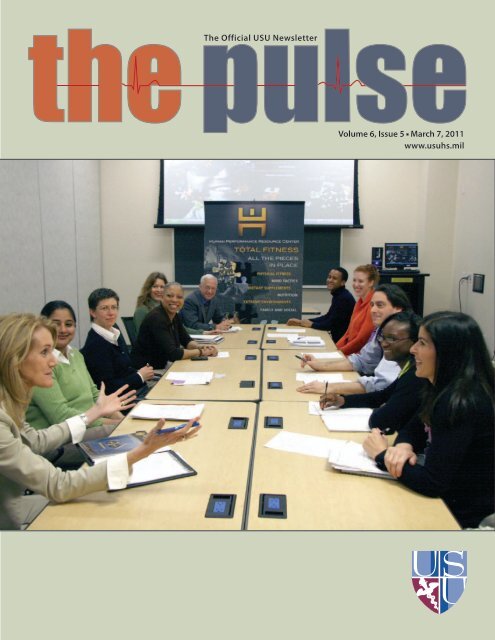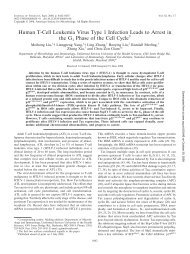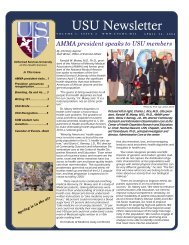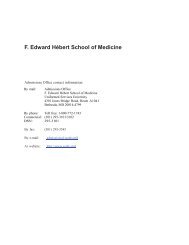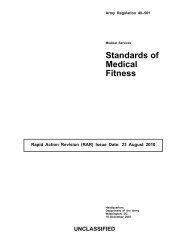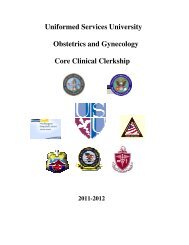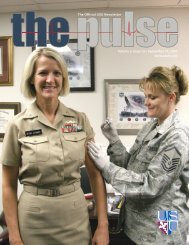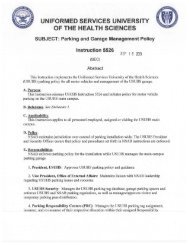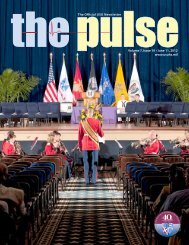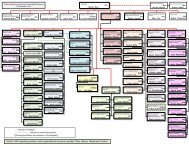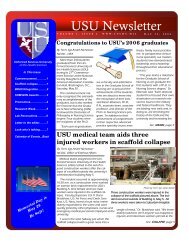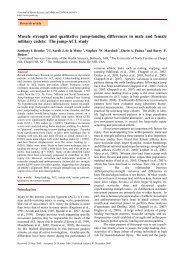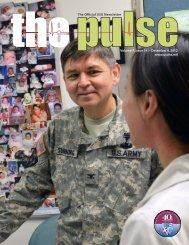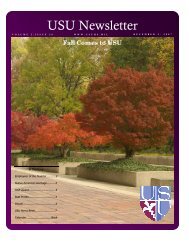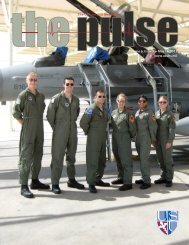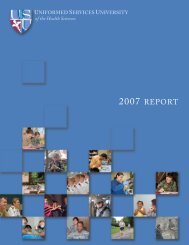Vol. 6, Issue 5 03/07/11 - Uniformed Services University of the ...
Vol. 6, Issue 5 03/07/11 - Uniformed Services University of the ...
Vol. 6, Issue 5 03/07/11 - Uniformed Services University of the ...
Create successful ePaper yourself
Turn your PDF publications into a flip-book with our unique Google optimized e-Paper software.
The Official USU Newsletter<br />
<strong>Vol</strong>ume 6, <strong>Issue</strong> 5 n March 7, 20<strong>11</strong><br />
www.usuhs.mil
USU says goodbye to finance <strong>of</strong>ficer<br />
by Staff Sgt. Mat<strong>the</strong>w Rosine<br />
Sharon Willis<br />
Deputy Vice President for External<br />
Affairs and Managing Editor<br />
Ken Frager<br />
Public Affairs Specialist<br />
Staff Sgt. Mat<strong>the</strong>w Rosine<br />
Production Editor<br />
MC1 Chad Hallford<br />
Writer<br />
Christine Creenan-Jones<br />
Contributing Writer<br />
Lori Fields<br />
Layout and Design<br />
Production<br />
Editorial content is edited, prepared<br />
and provided by <strong>the</strong> USU Office <strong>of</strong><br />
External Affairs unless o<strong>the</strong>rwise<br />
indicated. The Pulse staff may<br />
include or exclude articles based<br />
upon news value, impact on <strong>the</strong><br />
university and space availability.<br />
Submissions<br />
The Pulse will be published<br />
bi-weekly on Mondays. The<br />
deadline for submissions is at 4 p.m.<br />
Tuesday prior to <strong>the</strong> publication<br />
date. Submissions can be sent to<br />
usunewsletter@usuhs.mil or by<br />
calling 301-295-0895.<br />
Photo by Sharon Willis<br />
On <strong>the</strong> cover<br />
The USU’s Human Performance Resource<br />
Center supports total force fitness<br />
through initiatives and informationsharing.<br />
See page 5 for HPRC’s latest<br />
Health Tips column.<br />
Photo by Staff Sgt. Mat<strong>the</strong>w Rosine<br />
Jim Wolff<br />
After more than two decades <strong>of</strong><br />
innovative and dedicated service,<br />
USU bid a fond farewell recently to a<br />
finance department icon.<br />
Jim Wolff, <strong>the</strong> USU financial services<br />
<strong>of</strong>ficer, retired from <strong>the</strong> <strong>University</strong> after<br />
more than 25 years <strong>of</strong> service.<br />
“The nicest thing about being here,<br />
and something I know I’ll miss, is <strong>the</strong><br />
people I got to work with,” Wolff said.<br />
“The people here enjoy <strong>the</strong>ir work and<br />
are happy to be here. You just don’t find<br />
that outside <strong>the</strong>se walls.”<br />
“I got here as a technical sergeant<br />
in May <strong>of</strong> 1982,” Wolff said. “Of<br />
course, financial operations were<br />
really different <strong>the</strong>n.”<br />
At that time, all travel for <strong>the</strong> USU<br />
was handled by Bolling Air Force Base,<br />
D.C. Almost all financial paperwork<br />
was done by hand; <strong>the</strong>re was no College<br />
and <strong>University</strong> Financial Systems<br />
(CUFS) program and <strong>the</strong> Henry M.<br />
Jackson Foundation was a two-person<br />
shop on USU’s ground floor.<br />
Tech Sgt. Wolff ’s initial stay at USU<br />
was from 1982 to 1985. Following a<br />
four-year tour <strong>of</strong> duty in Holland, he<br />
returned to <strong>the</strong> USU in 1989.<br />
By 1989, <strong>the</strong> USU had upgraded its<br />
financial system to <strong>the</strong> CUFS initiative .<br />
“When I came back to <strong>the</strong> USU<br />
several things had been updated,” said<br />
“The best thing about<br />
my time here is that<br />
I was able to help <strong>the</strong><br />
<strong>University</strong> operate<br />
more efficiently,<br />
improve departmental<br />
customer service and<br />
upgrade <strong>the</strong> quality<br />
services we <strong>of</strong>fer our<br />
customers.”<br />
Mr. Wolff. “But, it wasn’t too difficult<br />
<strong>of</strong> a transition for me because <strong>the</strong><br />
finance model here was modeled after<br />
<strong>the</strong> Air Force’s finance model.”<br />
He returned to <strong>the</strong> USU as Master<br />
Sergeant and as <strong>the</strong> senior NCO<br />
financial services <strong>of</strong>ficer in 1991,<br />
continuing in that role until 1994<br />
when he retired from <strong>the</strong> Air Force.<br />
But, Mr. Wolff didn’t leave his USU<br />
home. Upon retirement he immediately<br />
returned to his “old” <strong>of</strong>fice as a<br />
civilian where he has been ever since.<br />
“We have grown in incredible<br />
ways here,” Wolff said. “Back in <strong>the</strong><br />
early days, <strong>the</strong>re was no grant award<br />
program. There was no Graduate<br />
School <strong>of</strong> Nursing. It is just amazing<br />
how we have grown.”<br />
In 1995, Wolff also helped transition<br />
in <strong>the</strong> USU Government Travel Card<br />
program, <strong>the</strong> DAI system and dozens <strong>of</strong><br />
o<strong>the</strong>r innovations.<br />
“The best thing about my time<br />
here is that I was able to help <strong>the</strong><br />
<strong>University</strong> operate more efficiently,<br />
improve departmental customer<br />
service and upgrade <strong>the</strong> quality<br />
services we <strong>of</strong>fer our customers,”<br />
Wolff said. “But for me it has always<br />
been about <strong>the</strong> people. Every one<br />
here is a friend and I can’t think <strong>of</strong> a<br />
better assignment.”<br />
2 <strong>the</strong> pulse March 7, 20<strong>11</strong>
Prospective students receive insider’s view<br />
by Ken Frager<br />
The USU chapter <strong>of</strong> <strong>the</strong> Student<br />
National Medical Association (SNMA)<br />
hosted <strong>the</strong> organization’s quarterly<br />
business meeting in conjunction with<br />
an undergraduate open house recently,<br />
welcoming more than 20 prospective<br />
students from <strong>the</strong> mid-Atlantic onto<br />
<strong>the</strong> campus. Students from Norfolk<br />
State <strong>University</strong> in Virginia, <strong>University</strong><br />
<strong>of</strong> Maryland Baltimore County,<br />
Howard <strong>University</strong> and Towson <strong>University</strong>,<br />
among o<strong>the</strong>rs, were mentored<br />
and informed by some <strong>of</strong> USU’s finest<br />
medical students during <strong>the</strong> full-day<br />
program. Included in <strong>the</strong> activities was a<br />
panel discussion about military medical<br />
education, how to prepare for medical<br />
school, and strategies for MCAT success.<br />
“Hosting <strong>the</strong>se students allows us to<br />
‘touch’ <strong>the</strong>m on our own turf, where we<br />
have <strong>the</strong>ir attention and already have <strong>the</strong>ir<br />
interest,” said Navy Capt. (Dr.) Margaret<br />
Calloway. “We can establish a relationship<br />
with <strong>the</strong>m that benefits us even if<br />
<strong>the</strong>y choose o<strong>the</strong>r means <strong>of</strong> pursuing<br />
Photo by Ken Frager<br />
Second-year medical students Ens. Christine Soohoo (PHS) and Ens. Camille Costan-Toth<br />
(Navy) answer questions from some <strong>of</strong> <strong>the</strong> visiting prospective students.<br />
a military medical education like <strong>the</strong><br />
Health Pr<strong>of</strong>essions Scholarship Program.”<br />
Dr. Yvonne Renee (Lee) Bright (SoM<br />
‘89) spoke to <strong>the</strong> students about her<br />
experiences at USU, along with her Navy<br />
medicine career, reminding attendees<br />
that <strong>the</strong>y had <strong>the</strong> opportunity to not<br />
only gain an incredibly valuable education,<br />
but to give something back to <strong>the</strong>ir<br />
country and community. “My military<br />
career ended almost a decade ago, which<br />
allowed me to pursue private practice<br />
near my family in Sou<strong>the</strong>rn Maryland. I<br />
don’t regret even for a day <strong>the</strong> path that<br />
I have followed,” said Dr. Bright.<br />
The SNMA was founded in 1964<br />
by students at Howard <strong>University</strong><br />
College <strong>of</strong> Medicine and Meharry<br />
Medical College. According to <strong>the</strong><br />
SNMA website, it is <strong>the</strong> oldest and<br />
largest student organization representing<br />
<strong>the</strong> needs and interests <strong>of</strong> medical<br />
students <strong>of</strong> color. Today <strong>the</strong>re are<br />
more than 6,000 members nationwide.<br />
The USU chapter hopes to make <strong>the</strong><br />
open house an annual event.<br />
MedXellence provides one-<strong>of</strong>-a-kind opportunity for medical leaders<br />
by Staff Sgt. Mat<strong>the</strong>w Rosine and Ken Frager<br />
The United States Congress in 1993,<br />
through a Tri-Service study group<br />
called <strong>the</strong> Joint Medical Executive Skills<br />
Development Group, established <strong>the</strong> “40<br />
competencies,” skills deemed essential for<br />
successful performance as commander<br />
<strong>of</strong> a military medical treatment facility<br />
(MTF). The need to teach <strong>the</strong>se competencies<br />
was <strong>the</strong> basis for establishing<br />
USU’s MedXellence program in1994.<br />
MedXellence is an actively managed<br />
course with a continuously updated<br />
curriculum. “We take real-life situations,<br />
turn <strong>the</strong>m into unfolding case studies<br />
and build upon <strong>the</strong> existing skills and<br />
experiences <strong>of</strong> participants to formulate<br />
workable solutions to different scenarios,”<br />
said Galen Barbour, MD, director <strong>of</strong> <strong>the</strong><br />
Health <strong>Services</strong> Administration program<br />
in <strong>the</strong> USU Department <strong>of</strong> Preventive<br />
Medicine and Biometrics, under which<br />
<strong>the</strong> MedXellence program falls.<br />
“We provide structured tools,<br />
concepts and strategies to help ensure<br />
success for MTF and MHS leaders,” said<br />
Dr. Barbour. “Over <strong>the</strong> course <strong>of</strong> our<br />
development we have restructured and<br />
updated not just our curriculum, but <strong>the</strong><br />
way we get information out to participants.”<br />
Courses are <strong>of</strong>fered five times<br />
each year at Armed Forces Recreation<br />
Centers around <strong>the</strong> world. While <strong>the</strong>re<br />
is no tuition for attending, <strong>the</strong> student’s<br />
command is required to fund travel and<br />
per diem expenses.<br />
The MedXellence course uses interrelated<br />
modules that emphasize learning<br />
through web-based course pre-work,<br />
classroom lectures, workshops, an<br />
interwoven case study and small group<br />
educational activities.<br />
The five-day course is intended for<br />
senior MHS executives typically from <strong>the</strong><br />
O-4/O-6 ranks. The hands-on interactive<br />
nature <strong>of</strong> <strong>the</strong> course make <strong>the</strong> participants’<br />
own experiences critical to <strong>the</strong><br />
learning process. Students are expected<br />
to exercise leadership, actively participate<br />
in course discussions and provide<br />
mentorship and followership skills.<br />
“We keep up to date with modern<br />
technological advances and many <strong>of</strong> <strong>the</strong><br />
people teaching this course are involved<br />
in <strong>the</strong> overall strategic planning <strong>of</strong> <strong>the</strong><br />
MHS,” Dr. Barbour said. “Our students<br />
hear information from those who lived<br />
it. They gain a real understanding <strong>of</strong><br />
leadership and success, and <strong>the</strong>y graduate<br />
as problem solvers.”<br />
The next MedXellence program will<br />
be held April 3 - 8 in Lake Buena Vista,<br />
Fla. Prospective students are encouraged<br />
to make arrangements to attend<br />
<strong>the</strong> course as soon as possible. Applications<br />
can be submitted online at http://<br />
medxellence.usuhs.mil.<br />
The Official USU Newsletter 3
Alumni fill interim leadership roles<br />
by MC1 Chad Hallford and Ken Frager<br />
The Pulse Spotlight<br />
Photo by Thomas Balfour<br />
Navy Cmdr. (Dr.) Patricia McKay<br />
While <strong>the</strong> USU Norman M. Rich<br />
Department <strong>of</strong> Surgery reviews applicants<br />
to fill <strong>the</strong> department chair left vacant<br />
with <strong>the</strong> passing <strong>of</strong> Army Col. (Dr.) David<br />
Burris in late 2010, Navy Cmdr. (Dr.)<br />
Patricia McKay (SoM ‘93) has stepped<br />
away from <strong>the</strong> School <strong>of</strong> Medicine<br />
Commandant post to serve in an interim<br />
role. Ano<strong>the</strong>r USU graduate, Navy Cmdr.<br />
(Dr.) Lisa Pearse (SoM ‘91), from <strong>the</strong><br />
Department <strong>of</strong> Preventive Medicine and<br />
Biometrics, fills in as interim School <strong>of</strong><br />
Medicine Commandant.<br />
“As department chair, my responsibilities<br />
are different,” said Cmdr.<br />
McKay. “While student education is<br />
<strong>the</strong> primary mission, research also is a<br />
major focus. And while as Commandant<br />
I interacted with <strong>the</strong> entire<br />
student population, my focus now is<br />
predominantly with students who are<br />
considering a career in surgery.”<br />
According to Cmdr. McKay, <strong>the</strong> new<br />
permanent chair will have <strong>the</strong> opportunity<br />
to build on <strong>the</strong> strong foundation<br />
created by <strong>the</strong> past surgery chairs,<br />
Dr. Norman Rich (1977-2002) and<br />
Dr. Burris (2002-2010). “The department<br />
has a wonderful staff <strong>of</strong> clinical<br />
and research personnel who are eager<br />
to meet <strong>the</strong> challenges <strong>of</strong> curriculum<br />
reform and continue <strong>the</strong> USU mission,”<br />
said Cmdr. McKay.<br />
“For me personally, this has been a<br />
wonderful opportunity to learn more<br />
Photo by Thomas Balfour<br />
Navy Cmdr. (Dr.) Lisa Pearse<br />
about operations behind <strong>the</strong> scenes.<br />
As a former medical student and as<br />
commandant, <strong>the</strong>re are many aspects <strong>of</strong><br />
<strong>the</strong> <strong>University</strong> for which I did not have<br />
an understanding. As a clinical chair, I<br />
have <strong>the</strong> privilege to facilitate <strong>the</strong> development<br />
<strong>of</strong> our students, those interested<br />
in a career in surgery and those who<br />
pass through surgery as part <strong>of</strong> <strong>the</strong>ir<br />
overall training. Fur<strong>the</strong>rmore, I have<br />
had <strong>the</strong> opportunity to witness and add<br />
to <strong>the</strong> tremendous research endeavors<br />
being undertaken here,” said McKay.<br />
“The most important obstacle as<br />
an interim chair is remembering that<br />
I will be turning over <strong>the</strong> department<br />
to ano<strong>the</strong>r chair sometime in <strong>the</strong> near<br />
future. I really have to consider carefully<br />
<strong>the</strong> direction we take and be sure that<br />
we move forward in a way that will<br />
make <strong>the</strong> transition to a new, permanent<br />
chair smooth.”<br />
As interim commandant, Cmdr. Pearse<br />
faces her own challenges. “The greatest<br />
challenge thus far has been getting to<br />
know <strong>the</strong> students. I am outnumbered<br />
about 600 to 1. More than providing<br />
<strong>the</strong>m an example <strong>of</strong> great leadership, I am<br />
responsible for providing guidance. This<br />
requires me to become more personalized,<br />
and involved in knowing my<br />
students. I am excited to shape <strong>the</strong> future<br />
<strong>of</strong> military medicine and be a positive<br />
influence for <strong>the</strong>se up and coming<br />
medical leaders,” said Cmdr. Pearse.<br />
Name:<br />
Verna M. Hill<br />
Photo by Staff Sgt. Mat<strong>the</strong>w Rosine<br />
Duty title:<br />
Supervisory Financial Management<br />
Analyst for <strong>the</strong> Budget Division in Financial<br />
and Manpower Management.<br />
How long have you been at <strong>the</strong> USU?<br />
I came to USU in February 1989. I started<br />
as a Manpower Technician for <strong>the</strong> Henry<br />
M. Jackson Foundation. I became a Federal<br />
employee in 1991. It is hard to believe that<br />
22 years have passed so quickly.<br />
What brought you to USU?<br />
I had a friend that worked in Civilian<br />
Human Resources and she mentioned<br />
to me that Financial and Manpower<br />
Management was in <strong>the</strong> process <strong>of</strong> hiring<br />
ano<strong>the</strong>r position in Budget. I had always<br />
worked for private industry, so I was a<br />
little scared. Things went very well.<br />
What is your favorite part <strong>of</strong> <strong>the</strong> USU?<br />
At USU you get to meet lots <strong>of</strong> nice and<br />
wonderful people. Some I have talked to on<br />
<strong>the</strong> telephone many times but have never<br />
met. They are more than happy to help if<br />
you need information or assistance. You<br />
just need to ask <strong>the</strong> right questions. USU<br />
has been great to me. I want to say thank<br />
you to everyone!<br />
What would you pass on to people<br />
new to <strong>the</strong> USU?<br />
USU is a wonderful place to work.<br />
The location is great and it has lovely<br />
landscaping. When you come here do <strong>the</strong><br />
best job that you can and enjoy each day.<br />
4 <strong>the</strong> pulse March 7, 20<strong>11</strong>
USU Navy Company Commander<br />
among honorees for leadership award<br />
by Ken Frager<br />
HPRC Health Tips<br />
The Human Performance<br />
Resource Center Health Tips is a<br />
new column intended to provide <strong>the</strong><br />
USU community with information to<br />
help develop and maintain a healthy<br />
lifestyle. Check out <strong>the</strong> HPRC website<br />
at: http://humanperformancere<br />
sourcecenter.org.<br />
Navy Cmdr. René Hernandez teaches part <strong>of</strong> <strong>the</strong> cold water survival<br />
course for first-year medical students.<br />
Navy Cmdr. René Hernandez<br />
was among <strong>the</strong> three finalists for <strong>the</strong><br />
20<strong>11</strong> Joy Bright Hancock Leadership<br />
(JBH) Award senior <strong>of</strong>ficer category,<br />
which annually honors <strong>the</strong> visionary<br />
leadership <strong>of</strong> service members whose<br />
ideals and dedication foster a positive<br />
working environment for reinforcing<br />
and fur<strong>the</strong>ring <strong>the</strong> integration <strong>of</strong><br />
women into <strong>the</strong> Navy.<br />
“We all know Cmdr. Hernandez<br />
as an extremely well-respected and<br />
highly-regarded military <strong>of</strong>ficer and<br />
role model,” said Navy Capt. (Dr.)<br />
Tanis Batsel Stewart, USU Brigade<br />
Commander. “With more than 90<br />
nominees originially submitted, it is<br />
rewarding to know <strong>the</strong> panel reviewing<br />
<strong>the</strong>se award packages recognized<br />
<strong>the</strong> same strengths, deliberating over<br />
<strong>the</strong> three finalists for a full week before<br />
selecting <strong>the</strong> winner.”<br />
“I was completely blown away and<br />
humbled when I found out that I had<br />
been nominated,” said Cmdr. Hernandez.<br />
“And to find out that <strong>the</strong> person<br />
nominating me was one <strong>of</strong> our medical<br />
students, Navy Ensign Jeffrey Fennelly,<br />
made it even that much more meaningful.<br />
I am very honored to have been<br />
nominated and <strong>the</strong> fact that I was<br />
considered among <strong>the</strong> select in <strong>the</strong><br />
Navy certainly is appreciated.”<br />
Photo by Ken Frager<br />
According to Ensign Fennelly, Cmdr.<br />
Hernandez is one <strong>of</strong> those people<br />
who performs her job so well and so<br />
smoothly, while garnering little praise<br />
or attention, who is very deserving <strong>of</strong><br />
this recognition.<br />
“When I first read about <strong>the</strong><br />
award in a Navy-wide message in<br />
December, I knew Cmdr. Hernandez<br />
would be perfect for it,” said Ensign<br />
Fennelly. “She is <strong>the</strong> leader <strong>of</strong> approximately<br />
60 female medical students --<br />
most with no prior Navy experience.<br />
Because she is such a humble, mildmannered<br />
leader, few people know<br />
<strong>of</strong> her Ph.D. in Neuroscience or her<br />
membership in <strong>the</strong> Women Diver’s<br />
Hall <strong>of</strong> Fame. It was a real privilege to<br />
get to know Dr. Hernandez and her<br />
career better. Like most people in <strong>the</strong><br />
Undersea Medicine community, she<br />
‘flies below <strong>the</strong> radar’ and deserves to<br />
be recognized for an excellent career.<br />
I hope she gets nominated (and wins)<br />
next year!”<br />
Established in 1987, <strong>the</strong> Joy Bright<br />
Hancock Leadership Awards recognize<br />
inspirational leadership <strong>of</strong> Navy<br />
service members on active or reserve<br />
duty. The JBH Awards are co-sponsored<br />
by <strong>the</strong> Sea Service Leadership Association<br />
(SSLA) and <strong>the</strong> Military Officers<br />
Association <strong>of</strong> America (MOAA).<br />
Make a plan to accomplish<br />
your goals<br />
Like many o<strong>the</strong>rs, as <strong>the</strong> New<br />
Year’s ball dropped, you probably<br />
made promises that this will be <strong>the</strong><br />
year <strong>of</strong> self-improvement and that<br />
this will be <strong>the</strong> year you succeed.<br />
Then May arrives, and you are still<br />
at square one with your resolution.<br />
It’s easy to make a resolution,<br />
and much harder to stick to it.<br />
Like with many things, making a<br />
plan may be <strong>the</strong> best bet. The old<br />
adage rings true: “Those that fail<br />
to plan, plan to fail.”<br />
Be realistic. Be honest with<br />
yourself. Push yourself, but don’t<br />
make your goal so difficult that<br />
you give up early on. Start with<br />
something that you can stick with,<br />
be consistent, and gradually move<br />
on to something more challenging.<br />
Be specific. Try establishing<br />
something you can quantify or<br />
check <strong>of</strong>f each day. No matter if<br />
your goal is something small or<br />
something grand, account for all<br />
efforts made towards <strong>the</strong> larger goal.<br />
Write everything down. Make<br />
note <strong>of</strong> <strong>the</strong> good and not-so-good<br />
days. Writing things down reminds<br />
you that you’re on a mission and<br />
are actively pursuing it. It can also<br />
help you identify areas where you<br />
may need help.<br />
Post for all to see. Place this<br />
plan where it is easily visible so<br />
you don’t forget that you’re pursuing<br />
a goal and where o<strong>the</strong>rs who<br />
are close to you can see it. That<br />
way <strong>the</strong>y can support you and hold<br />
you accountable for your actions.<br />
The Official USU Newsletter 5
Ori takes senior employee honors to Southwest campus<br />
by Staff Sgt. Mat<strong>the</strong>w Rosine<br />
Leeann Ori, <strong>the</strong> administrative<br />
<strong>of</strong>ficer in <strong>the</strong> Office <strong>of</strong> <strong>the</strong><br />
Senior Vice President for <strong>University</strong><br />
Programs (Sou<strong>the</strong>rn Region), located<br />
in San Antonio, was named Senior<br />
Employee <strong>of</strong> <strong>the</strong> Quarter.<br />
“Leeann consistently has provided<br />
selfless service and tireless efforts in<br />
support <strong>of</strong> <strong>the</strong> many ordinary and<br />
extraordinary activities <strong>of</strong> USU’s sou<strong>the</strong>rn<br />
site,” said retired Maj. Gen. Patrick<br />
Sculley, DDS, MA, Senior Vice President<br />
for <strong>University</strong> Programs. “At <strong>the</strong><br />
same time, her contributions in support<br />
<strong>of</strong> <strong>the</strong> Be<strong>the</strong>sda campus allow us to<br />
operate in a very cohesive manner.”<br />
Mrs. Ori, who began her USU<br />
career in <strong>the</strong> External Affairs <strong>of</strong>fice in<br />
Be<strong>the</strong>sda, has been with <strong>the</strong> sou<strong>the</strong>rn<br />
<strong>of</strong>fice for 19 months. A diligent<br />
pr<strong>of</strong>essional, her value to <strong>the</strong> USU is<br />
seen in her support for a myriad <strong>of</strong><br />
important programs.<br />
She recently supported <strong>the</strong> USU<br />
Board <strong>of</strong> Regents (BoR) <strong>of</strong>f-site held<br />
in San Antonio, planning and coordinating<br />
tours and briefings between 12<br />
different major Department <strong>of</strong> Defense<br />
Courtesy Photo<br />
health activities, including <strong>the</strong> Center<br />
for Battlefield Health and Trauma, <strong>the</strong><br />
Institute for Surgical Research and <strong>the</strong><br />
Center for <strong>the</strong> Intrepid. In <strong>the</strong> process,<br />
Mrs. Ori orchestrated <strong>the</strong> participation<br />
<strong>of</strong> six different flag <strong>of</strong>ficers, two SES<br />
leaders and a wide variety <strong>of</strong> senior<br />
staff <strong>of</strong>ficers.<br />
Additionally, Mrs. Ori maintained<br />
<strong>the</strong> highest pr<strong>of</strong>essional standards in<br />
her continuing efforts impacting <strong>the</strong><br />
new Air Force and Navy Postgraduate<br />
Dental Schools. Specifically, she<br />
coordinated with senior leaders to facilitate<br />
and process <strong>the</strong> faculty appointments<br />
in accordance with sensitive BoR<br />
timelines. Mrs. Ori also has assisted<br />
<strong>the</strong> Army Dental Graduate Education<br />
Advisor in developing <strong>the</strong> documentation<br />
supporting <strong>the</strong> establishment <strong>of</strong><br />
<strong>the</strong> Army Postgraduate Dental School.<br />
Mrs. Ori serves as a subject matter<br />
expert concerning <strong>the</strong> Defense Travel<br />
System and travel management for<br />
<strong>the</strong> BoR’s academic subcommittee.<br />
Additionally she serves as a liaison for<br />
<strong>the</strong> <strong>University</strong> at <strong>the</strong> largest health education<br />
recruitment conference in <strong>the</strong> state<br />
<strong>of</strong> Texas, known as <strong>the</strong> “Texas Swing.”<br />
“In every endeavor, Ms. Ori’s attention<br />
to detail, pr<strong>of</strong>essional demeanor<br />
and engaging personality allow her to<br />
represent <strong>the</strong> <strong>University</strong> in <strong>the</strong> very<br />
best manner,” said Maj. Gen. Sculley.<br />
“She is a most positive reflection on<br />
this <strong>of</strong>fice and <strong>the</strong> <strong>University</strong> and I<br />
personally couldn’t be more pleased<br />
with her selection.”<br />
Editors Note: There were no<br />
junior employees nominated during<br />
this period.<br />
Telework support defined<br />
by Dennis Stutz<br />
Recently <strong>the</strong>re have been many<br />
requests for additional universityprovided<br />
laptops for <strong>the</strong> sole purpose <strong>of</strong><br />
supporting telework plans. The Office <strong>of</strong><br />
<strong>the</strong> CIO is a strong supporter <strong>of</strong> telework<br />
and continues to work to improve<br />
USU telework capabilities to <strong>the</strong> greatest<br />
extent possible, e.g. VPN upgrades,<br />
migration <strong>of</strong> various applications to<br />
online environments, and <strong>the</strong> introduction<br />
<strong>of</strong> laptops as part <strong>of</strong> <strong>the</strong> <strong>University</strong>’s<br />
standard computer hardware configurations.<br />
Faculty and staff who opted<br />
for laptops and were approved by <strong>the</strong>ir<br />
department chairs during <strong>the</strong> last two<br />
hardware refresh cycles probably already<br />
have all <strong>of</strong> <strong>the</strong> equipment on-hand to<br />
support a telework plan. Those that<br />
opted for or were only approved for<br />
desktops may not have all <strong>of</strong> <strong>the</strong> equipment<br />
required. Unfortunately, <strong>the</strong> Office<br />
<strong>of</strong> <strong>the</strong> CIO is not funded to replace<br />
existing desktops that are not at end <strong>of</strong><br />
life (EOL) with new laptops in order<br />
to accommodate a change <strong>of</strong> telework<br />
status. Desktops are replaced approximately<br />
every 4 years and anyone with a<br />
desktop serial number beginning with<br />
04<strong>07</strong>M (about 300 users) is scheduled to<br />
have <strong>the</strong>ir system replaced in <strong>the</strong> April/<br />
May 20<strong>11</strong> timeframe. Please use this<br />
opportunity to assess your individual<br />
telework requirements.<br />
In light <strong>of</strong> new legislation and DoD<br />
emphasis on encouraging telework,<br />
<strong>the</strong> Office <strong>of</strong> <strong>the</strong> CIO will work with<br />
<strong>the</strong> <strong>University</strong> administration on<br />
interim steps and a POM-14 proposal<br />
for an increase in laptop purchases to<br />
expand telework options even fur<strong>the</strong>r.<br />
In <strong>the</strong> meantime, <strong>the</strong> following URL<br />
(http://www.usuhs.mil/helpdesk/<br />
policies.html) is where you can<br />
find a summary <strong>of</strong> provided USU<br />
telework support.<br />
The OCIO will continue to<br />
provide updates and notification <strong>of</strong><br />
changes to <strong>the</strong> university community.<br />
If you have any problems, Mr.<br />
Dennis Stutz, Director, Customer<br />
Service, is acting as an ombudsman<br />
to help communicate issues. He can<br />
be contacted at (301) 295-9560 or<br />
dstutz@usuhs.mil.<br />
6 <strong>the</strong> pulse March 7, 20<strong>11</strong>
Briefs<br />
Inclement wea<strong>the</strong>r policy<br />
During <strong>the</strong> upcoming winter season,<br />
USU will remain open for business<br />
except for certain situations such as<br />
inclement wea<strong>the</strong>r.<br />
If <strong>the</strong> operating status <strong>of</strong> <strong>the</strong> <strong>University</strong><br />
changes, it will be updated on <strong>the</strong><br />
<strong>University</strong>’s home page, www.usuhs.mil.<br />
This page will be updated immediately<br />
if <strong>the</strong> operating status changes.<br />
In addition to <strong>the</strong> Web page, a<br />
broadcast to <strong>the</strong> USU community via<br />
email and recorded phone message<br />
will be available.<br />
To access this information by phone,<br />
call (301) 295-3<strong>03</strong>9.<br />
In some cases, such as inclement<br />
wea<strong>the</strong>r, USU’s status will be made available<br />
via television. All USU students,<br />
military, faculty and essential personnel<br />
are encouraged to check to <strong>the</strong> <strong>University</strong>’s<br />
Web site regularly to stay aware <strong>of</strong><br />
<strong>the</strong> current operating procedures.<br />
Using Computer Resources<br />
Security incidents continue to be<br />
a drain to limited USU Information<br />
Assurance manpower. The following<br />
highlight current DoD policy and<br />
best practices:<br />
Personnel must not install self-coded<br />
or non-licensed s<strong>of</strong>tware on network<br />
resources; add, remove, configure,<br />
or attempt to modify USU computer<br />
operating systems or programs; move<br />
audio/visual or network cables, computers<br />
or attempt to connect personal<br />
computers to <strong>the</strong> network including<br />
MDL and lecture hall spaces; connect<br />
personal devices except for those previously<br />
authorized by NOC; download<br />
pornographic material and store or<br />
display <strong>of</strong>fensive material, such as<br />
racist literature, sexually harassing or<br />
obscene language or material; store or<br />
process classified information on any<br />
USU system.<br />
Personnel must not permit unauthorized<br />
individuals access to a<br />
government-owned or governmentoperated<br />
system or program; access<br />
online gambling, games and social<br />
engineering sites, dates or times.<br />
Helpdesk Closure<br />
The NOC helpdesk is closed for training<br />
on Thursdays from 10 to <strong>11</strong> a.m.<br />
During this time, you can leave a<br />
voicemail message at 295-9800, utilize<br />
<strong>the</strong> HEAT Self Service (http://www.<br />
usuhs.mil/uis/forms/trouble.html), or<br />
email help@usuhs.mil.<br />
If an emergency should arise, please<br />
call 295-9870.<br />
Exercise/Fitness Areas<br />
Physical Fitness training should be<br />
conducted in designated areas.<br />
The only authorized space for PT<br />
within <strong>the</strong> university is room G060.<br />
The campus’ Student Community<br />
Lounge area is also authorized,<br />
but only during specified PFT dates<br />
or times.<br />
Pr<strong>of</strong>essional activities<br />
The Department <strong>of</strong> Defense and USU<br />
policy requires that all employees, both<br />
military and civilian, receive approval<br />
for engaging in any activity outside <strong>the</strong>ir<br />
work environment, which involves <strong>the</strong>ir<br />
pr<strong>of</strong>essional expertise or government<br />
occupation, and involves compensation.<br />
This approval is required prior to<br />
engaging in <strong>the</strong> activity.<br />
In order to get approval, any employee<br />
can complete a USU Form 1004.<br />
This completed form must be approved<br />
and signed by each department chair or<br />
activity head.<br />
These forms are available in <strong>the</strong><br />
General Counsel’s <strong>of</strong>fice or online at <strong>the</strong><br />
USU OGC Web site.<br />
Completed forms must be turned in to<br />
<strong>the</strong> General Counsel’s <strong>of</strong>fice. The form will<br />
be routed to <strong>the</strong> appropriate dean, brigade<br />
commander or USU president.<br />
Once processing is completed, a<br />
copy <strong>of</strong> <strong>the</strong> approved form will be<br />
returned to <strong>the</strong> employee for <strong>the</strong> employee’s<br />
records.<br />
ESC meetings<br />
The Enlisted Social Committee holds<br />
its monthly meetings on <strong>the</strong> first Tuesday<br />
<strong>of</strong> every month.<br />
Meetings are held at 9:30 a.m. in <strong>the</strong><br />
cafeteria’s small dining room.<br />
Being a part <strong>of</strong> <strong>the</strong> ESC is an excellent<br />
way for USU enlisted personnel to<br />
actively pursue volunteer opportunities<br />
at USU.<br />
Funding Applications<br />
The USU Merit Review<br />
Committee is accepting applications<br />
for <strong>the</strong> fiscal year 2012 USU<br />
Intramural Research Funding.<br />
Applications may be submitted<br />
for Pilot, Standard and<br />
Exploratory grant funding. New<br />
or revised applications will be<br />
accepted. Competing continuations<br />
are no longer funded. These<br />
applications are for basic, clinical<br />
or behavioral research.<br />
Projects will be evaluated for<br />
demonstrated relevance to military<br />
concerns and/or are specific to <strong>the</strong><br />
USU mission.<br />
Eligibility for funding from <strong>the</strong><br />
<strong>University</strong>’s intramural program is<br />
restricted to USU-billeted civilian<br />
and uniformed faculty members<br />
with full, associate or assistant<br />
pr<strong>of</strong>essor titles.<br />
Late applications will not be<br />
accepted and incomplete applications<br />
will not be reviewed.<br />
Applications must be submitted<br />
by June 17, 20<strong>11</strong>.<br />
For additional information:<br />
http://www.usuhs.mil/research/<br />
intramuralfunds.html or contact<br />
<strong>the</strong> Office <strong>of</strong> Research at<br />
(301) 295-33<strong>03</strong>.<br />
The Official USU Newsletter 7


